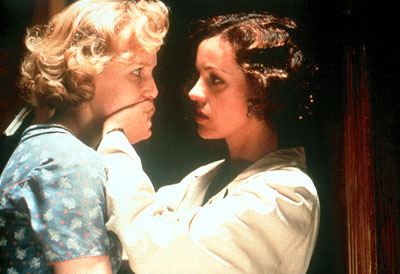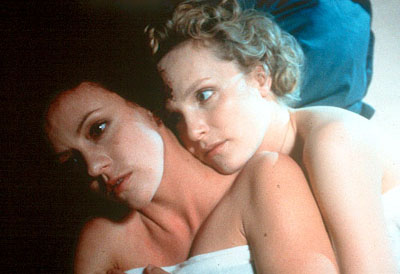

It seems that there are two kinds of movies about lesbians. The ones that are not as compelling (Better Than Chocolate, But I'm a Cheerleader) always try to blatantly inject some social message into the movie. This effectively ruins the movie. It becomes pure propaganda instead of a story. On the other hand, Boys Don't Cry simply told the story (albeit gruesomely at times) and let the story and characters speak for themselves. Maybe it helps that Boys Don't Cry and the new Aimee and Jaguar take their cues from actual events. Aimee and Jaguar, published in 1994, related the unlikely relationship between Felice Schrageheim and Lilly Wust, a Jew and a Nazi in the midst of World War II. Aimee and Jaguar were the aliases they used in letters to each other in order to conceal their identities.
Felice and Lilly are two opposites. Felice (Maria Schrader, Am I Beautiful?) works undercover for a German newspaper. She uses the information she gleans to help other Jews. Lilly (Juliane Kohler) is a housewife and mother. Her husband is away at war, and she is home. Aside from mothering, she has nothing to do. Felice is a free spirit. She flirts with other women incessantly and frequently skirts extremely dangerous circumstances. She sets her sights on Lilly, and the two begin a dangerous relationship. Felice introduces a new world to Lily, one with new friends and constant fun. Initially, Lilly is frightened of the concept of love between the two. However, Felice provides an alternative to a life of boredom. She brings joy to Lilly, something her husband does not provide. For Felice, Lilly serves almost as a mother. Lilly gives an innocent type of love to Felice, something she is not familiar with. This newfound commitment for Felice is difficult since she values her freedom and independence. She does not even tell Lilly she is Jewish until late in their relationship.
It takes a good hour before any sort of relationship begins, but director Max Faberbock, Rona Munro (Ladybird) and Erika Fischer (the author of the book) then take a delicate look at Felice and Lilly. They do not moralize excessively, preferring to examine the relationship through the eyes of the two main characters. In a sense, both are emotionally immature adults looking for something to latch onto in a time of confusion. Lilly's constant dalliances with other officers do not work. It is never really clear why Felice falls for Lilly, aside from the initial infatuation. Kohler and Schrader give emotional performances, with Kohler especially embodying the personality of one seemingly lost. Faberbock spends a little too much time setting up events, showing Felice's life and some of her activities in helping soldiers, but this does not really add depth to Felice's character. This only serves to lengthen the film and delaying the momentum that builds once the two meet. The "where are they now" updates at the end do not feel tacked on. Instead, they complete Lilly's incredible story, and also giving a sense of closure to Aimee and Jaguar.